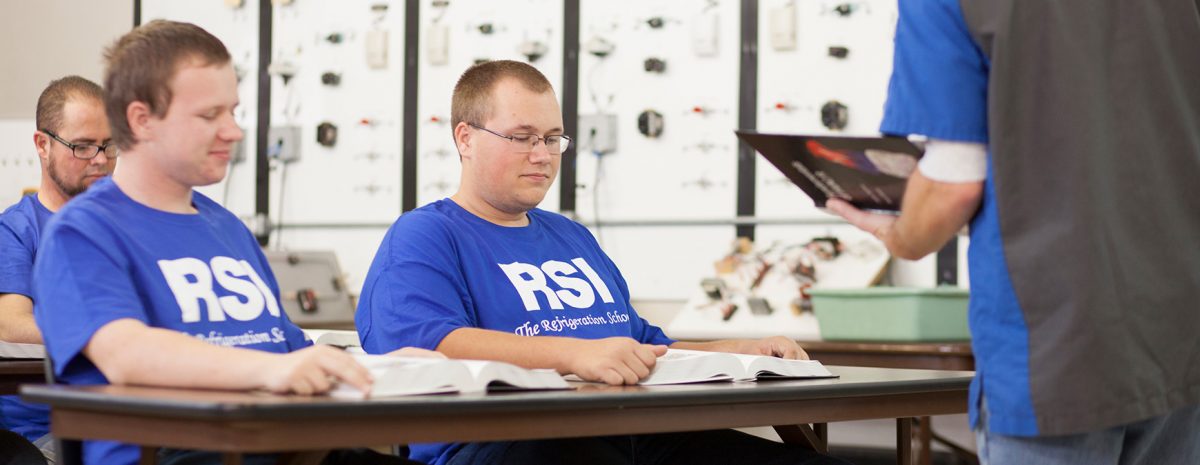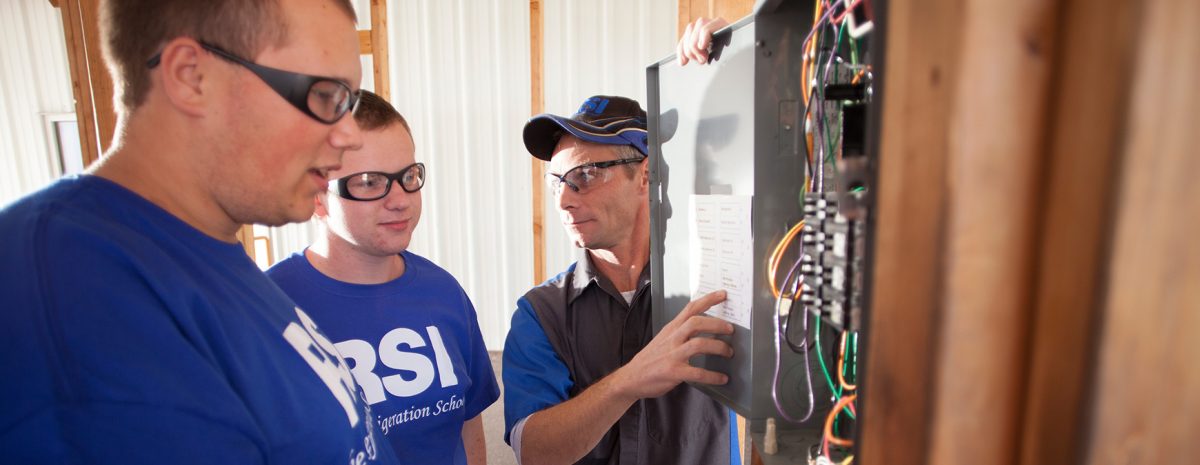RSI is a Great Training Option for Everyone
Learn more about how we can prepare you to advance your career.
Due to mounting student debt, more and more young people are asking themselves if spending money on an education is actually worth it, especially when there are well-paying jobs that don’t require a degree.1, 2
Even in the skilled trades, though, there is one general truth: candidates who completed post-secondary training typically earn more and have lower levels of unemployment than those with only a high school diploma or less.3
This is largely true for HVAC technicians, too. You don’t have to go to school for HVAC to become an HVAC technician like you have to go to med school to become a doctor. But adding a certificate or diploma in HVAC training to your resume may improve job opportunities.
Better Chances in the Job Market
As the U.S. Bureau of Labor Statistics (BLS) reports, employers generally prefer applicants with post-secondary education, such as the HVAC training offered at The Refrigeration School (RSI). HVAC systems have become increasingly complex, so many employers want to make sure that job candidates have up-to-date knowledge of HVAC technology.4
Generally speaking, job prospects for HVAC technicians look healthy. The BLS also indicates that those who are familiar with tablet computers and electronics and those who have honed their troubleshooting skills should have the best job opportunities.
Get Started on the Path to a New Career
Fill out our form to learn how we can help you change your life.
Considering that a lot of the demand for HVAC technicians is rooted in a growing emphasis on energy efficiency and environmental friendliness, those with green HVAC expertise will likely have good chances as well.5
Graduating from a well-rounded HVAC training program can help you show employers you have learned the fundamentals of refrigeration and electricity, understand the difference between residential and commercial systems and have practiced your troubleshooting skills.
Plus, your HVAC training certificate or diploma can demonstrate to potential employers that you have the grit and dedication needed to succeed in the HVAC industry.
Higher Earning Potential
How much you make as an HVAC technician can vary. It often depends on your employer, your area and your specific HVAC field.6 Generally speaking, however, you can make more if your educational level goes beyond high school.3
A study by Georgetown University’s Center on Education and the Workforce found that HVAC technicians with post-secondary training made $200,000 more over the span of a career than those with a high school diploma or less.7
Earning just $5 more per hour, for example, can make a huge difference over a lifetime: if you work 40 hours a week over 35 years (excluding weekends and an annual two-week vacation), you will work 351,750 hours over the span of your career. The additional $5 would translate into an extra $1.76 million.8
More Career Opportunities
Attending an HVAC school can also offer plenty of networking and career opportunities. You will likely encounter many HVAC professionals, such as your instructors. Your classmates may also have connections or offer advice that can help you land a job.8
At an HVAC school, you might get the chance to learn about professional HVAC organizations, HVAC trade organizations and conferences. Attending such events can help you meet potential employers, learn about the latest industry trends and further network with other HVAC technicians.
The Career Services Department at RSI can help you kick start your HVAC career, too. As an RSI student, you can receive free assistance with the following tasks:
- Resume preparation.
- Cover letter writing.
- Employment searches.
- Interview preparation.
- Job fairs.
- Employer/professional networking.
- Certification resources.
You may also obtain more information about local job fairs and other networking events. RSI’s Career Services Department works with both local Arizona and nationwide employers to help RSI graduates find job opportunities.
HVAC School – The First Step

Completing HVAC training could prove beneficial once you are on the job hunt because more and more employers are looking for applicants with this credential. Plus, studies show a postsecondary education can lead to higher earnings.7
Find out what you will learn in HVAC school to get a better idea of what to expect from an HVAC training program.
*According to BLS data May 2018, Heating, Air Conditioning, and Refrigeration Mechanics and Installers (499021) annual mean wage is $46,710 for the Phoenix area http://data.bls.gov/oes. Average starting salary for Refrigeration Technologies is $33,488 for RSI graduates employed during the 12 month period of 7/1/17 – 6/30/18.
Additional Sources
1 https://www.forbes.com/sites/zackfriedman/2019/02/25/student-loan-debt-statistics-2019/#27c90b65133f
2 https://www.cnbc.com/2019/04/24/the-10-highest-paying-jobs-you-can-get-without-a-college-degree.html
3 https://www.bls.gov/careeroutlook/2018/data-on-display/education-pays.htm
4 https://www.bls.gov/ooh/installation-maintenance-and-repair/heating-air-conditioning-and-refrigeration-mechanics-and-installers.htm#tab-4
5 https://www.bls.gov/ooh/installation-maintenance-and-repair/heating-air-conditioning-and-refrigeration-mechanics-and-installers.htm#tab-6
6 https://www.bls.gov/careeroutlook/2015/article/wage-differences.htm
7 https://www2.ed.gov/policy/highered/reg/hearulemaking/2011/collegepayoff.pdf (chart on page 31)
8 https://www.hvacschool.org/2017/08/is-hvac-school-worth-it/
This blog has been labeled as archived as it may no longer contain the most up-to-date data. For a list of all current blog posts, please visit our blog homepage at https://www.rsi.edu/blog/




